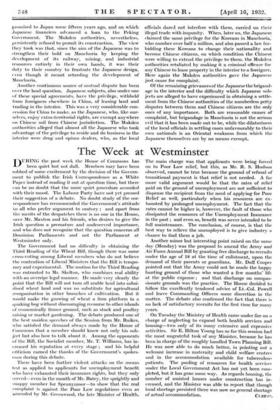The Week at Westminster
DTIRING the past week the House of Commons has . been quiet but not dull. Members may have been robbed of some excitement by the decision of the Govern- ment to publish the Irish Correspondence as a White Paper instead of reading it out at question time, but there can be no doubt that the more quiet procedure accorded with their mood. The Labour Party have not yet pressed their suggestion of a debate. No doubt study a the cor- respondence has reconunended the Government's attitude to all who prefer argument to oratory ; and apart from the merits of the despatches there is no one in the House, save Mr. Maxton and his friends, who desires to give the rish question a premature and undeserved importance, and who does not recognize that the question concerns all Dominion Parliaments and not the Parliament at Westminster only.
The Government had no difficulty in obtaining the Third Reading of the Wheat Bill, though there was some cross-voting among Liberal members who do not believe the contention of Liberal Ministers that the Bill is tempo- rary and experimental. The motion for the Third Reading was entrusted to Mr. Skelton, who combines real ability with an overripe legal manner. He made very clearly the point that the Bill will not turn all arable land into subsi- dised wheat land and was no substitute for agricultural reorganisation in other branches of cultivation. But it would make the growing of wheat a firm platform in a waking bog without discouraging recourse to other islands of economically firmer ground, such as stock and poultry raising or market gardening. The debate produced one of the best maiden speeches of the Session from Mr. Raikes, who satisfied the demand always made by the House of Commons that a member should know not only his sub- ject but also bow to talk about it. Among the opponents of the Bill, the Socialist member, Mr. T. Williams, has in- creased his • reputation at every stage ; and his helpful criticism earned the thanks of the Government's spokes- man during this debate.
There have been further violent attacks on the means test as applied to applicants for unemployment benefit who have exhausted their insurance rights, but they only served—even in the mouth of Mr. Batey, the sprightly and snappy member for Spennymoorto . show that the real complaint is .against the Poor Law regulations- even as amended by Mr. Greenwood, the late Minister of Health. The main charge was that applicants were being forced on to Poor Law relief, but this, as Mr. R. S. Hudson observed, cannot be true because the ground of refusal of transitional payment is that relief is not needed. A far more valid argument would be that the rates of relief paid on the ground of unemployment are not sufficient to dispense the recipient from the need of applying for Poor Relief as well, particularly when his resources are ex- hausted by prolonged unemployment. The fact that the rates cannot be higher is, however, the fault of those who dissipated the resources of the Unemployment Insurance in the past ; and even so, benefit was never intended to be full maintenance. The conclusion, of course, is that the best way to relieve the unemployed is to give industry a chance to find them a job.
Another minor but interesting point raised on the same day (Monday) was the proposal to amend the Army and Air Force Annual Bill by granting free discharge to recruits under the age of 18 at the time of enlistment, upon the demand of their parents or guardians. Mr. Duff Cooper pointed out that the Army could not be made the happy hunting ground of those who wanted a few months' life at the public expense ; and that discharge on compas- sionate grounds was the practice. The House decided to follow the excellently tendered advice of Lt.-Col. Powell and leave Commanding Officers some discretion in the matter. The debate also confirmed the fact that there is no lack of satisfactory recruits for the first time for many years.
On Tuesday the Ministry of Health came under fire on at charge of neglecting to expand both health services and housing—two only of its many extensive and expensive activities. Sir E. Hilton Young has so far this session had the most ungrateful task of any Minister, because he has been in charge of the roughly handled Town Planning Bill. He was now able to do much better, in pointing out a welcome increase in maternity and child welfare centres and in the accommodation available for tuberculous patients. The pooling of resources for health services under the Local Government Act has not yet been com- pleted, but it has gone some way. As regards housing, the number of assisted houses under construction has in- creased, and the Minister was able to report that though local shortage persisted there was now no general shortage of actual accommodation,








































 Previous page
Previous page